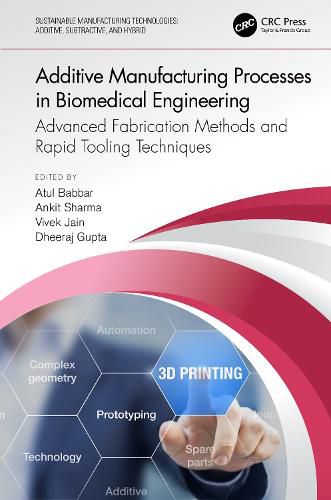Readings Newsletter
Become a Readings Member to make your shopping experience even easier.
Sign in or sign up for free!
You’re not far away from qualifying for FREE standard shipping within Australia
You’ve qualified for FREE standard shipping within Australia
The cart is loading…






This book covers innovative breakthroughs in additive manufacturing processes used for biomedical engineering. More and more, 3D printing is selected over traditional manufacturing processes, especially for complex designs, because of the many advantages such as fewer restrictions, better production cost savings, higher quality control, and accuracy.
Current challenges and opportunities regarding material, design, cost savings, and efficiency are covered along with an outline of the most recent fabrication methods used for converting biomaterials into integrated structures that can fit best in anatomy while still obtaining the necessary architecture, mechanical reliability, biocompatibility, and anti-bacterial characteristics needed. Additional chapters will also focus on selected areas of applications such as bionics, affordable prostheses, implants, medical devices, rapid tooling, and drug delivery.
Additive Manufacturing Processes in Biomedical Engineering: Advanced Fabrication Methods and Rapid Tooling Techniques acts as a first-hand reference for commercial manufacturing organizations which are mimicking tissue organs by using additive manufacturing techniques. By capturing the current trends of today's manufacturing practices this book becomes a one-stop resource for manufacturing professionals, engineers in related disciplines, and academic researchers.
$9.00 standard shipping within Australia
FREE standard shipping within Australia for orders over $100.00
Express & International shipping calculated at checkout
This book covers innovative breakthroughs in additive manufacturing processes used for biomedical engineering. More and more, 3D printing is selected over traditional manufacturing processes, especially for complex designs, because of the many advantages such as fewer restrictions, better production cost savings, higher quality control, and accuracy.
Current challenges and opportunities regarding material, design, cost savings, and efficiency are covered along with an outline of the most recent fabrication methods used for converting biomaterials into integrated structures that can fit best in anatomy while still obtaining the necessary architecture, mechanical reliability, biocompatibility, and anti-bacterial characteristics needed. Additional chapters will also focus on selected areas of applications such as bionics, affordable prostheses, implants, medical devices, rapid tooling, and drug delivery.
Additive Manufacturing Processes in Biomedical Engineering: Advanced Fabrication Methods and Rapid Tooling Techniques acts as a first-hand reference for commercial manufacturing organizations which are mimicking tissue organs by using additive manufacturing techniques. By capturing the current trends of today's manufacturing practices this book becomes a one-stop resource for manufacturing professionals, engineers in related disciplines, and academic researchers.